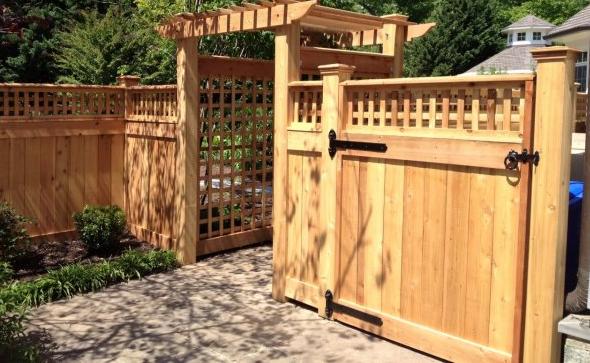Featured

When preparing to install a fencing around your residential or commercial property, among the primary steps is comprehending the permitting demands in your area. While the procedure may appear uncomplicated, local guidelines can differ greatly depending on where you live. Safeguarding the appropriate licenses before starting the installation is essential to prevent potential fines, disagreements with neighbors, or even having to remove your fence. Below's what you require to find out about obtaining the required licenses for your fence installation.
Why Do You Need a License for a Fencing? A permit is commonly needed for fencing installations to make certain conformity with neighborhood building ordinance, zoning regulations, and safety laws. Allowing helps local authorities keep harmony in area aesthetic appeals, safety, and environmental considerations. It likewise guarantees that the fencing does not interfere with energy lines or public rooms, and that it adheres to height and boundary limitations.

Typical Permits Required for Fencing Installation. Structure License. Many areas need a structure authorization for fence installment, specifically if the fence goes beyond a specific height (usually over 6 feet) or is made from non-standard products. This license ensures that your fencing follows local building ordinance. In some areas, the building division will check the website to make certain that the fence meets safety and structural criteria.
Zoning Permit. Zoning licenses are created to make certain that your fence adheres to local zoning regulations, consisting of troubles from building lines, easements, and rights-of-way. Zoning regulations vary from city to city, and sometimes, your fencing might require to be held up a specific number of feet from the sidewalk or roadway. If your fencing is in a historical area or other specifically designated locations., a zoning license might likewise be essential.

Fencing Permit. In some places, a specific "fence authorization" might be required. This is typically needed when building a fencing for houses. The local government might specify the height, product, and style of the fence to guarantee it mixes well with the surrounding community. Some cities restrict chain-link fences in front lawns or have details guidelines for personal privacy fencings.
HOA Approval. You may need approval before installing a fence if your home is component of a house owners organization (HOA) HOA guidelines typically consist of particular rules regarding the type, height, color, and products for fencings to preserve the neighborhood's visual appeals. HOA laws can be more stringent than city codes, so always examine their standards prior to progressing.
Easement or Utility Authorizations. If your fencing will certainly be near or throughout an easement (such as an utility easement), you might require to get approval from the utility company or various other entities that manage the land. This is particularly essential if you prepare to mine fencing messages, as it guarantees you will not harm underground utilities like gas, water, or power lines.
Exactly How to Discover What Permits Are Needed. The most effective means to establish which licenses are needed for your fencing installment is to call your local building department or local workplace. They can give you with particular info about requirements in your location. Below are a couple of steps you can require to learn:
Inspect the City or Area Internet site: Lots of neighborhood governments supply details concerning fencing installment allows online. Seek building or zoning sections on their site. Call or Check Out Citizen Government Workplaces: If the details is not conveniently available online, calling or visiting the regional workplace face to face can clarify what's needed. Get In Touch With a Professional Specialist: If you're unsure or overloaded by the procedure, a neighborhood specialist or fencing installment firm can assist in navigating the permitting procedure, as they recognize with regional laws. What Takes place If You Don't Obtain an Authorization? Falling short to get the needed licenses can lead to a variety of repercussions. In numerous areas, you can encounter penalties, and your fence could be purchased to be removed. Additionally, if you sell your residential property in the future, the lack of appropriate authorizations might be a warning for customers and impact the sale. Permitting ensures that your fence is certified and helps stay clear of future issues.
Conclusion. Prior to mounting a fence around your residential property, it's vital to inspect whether an authorization is called for in your area. Building permits, zoning licenses, HOA approval, and utility permissions might all contribute in your fence installment process. Taking the time to research study and acquire the essential permits will not just guarantee that you're complying with neighborhood guidelines, yet also aid secure your investment and keep the honesty of your building.
Latest Posts
Discover Dothan Relies on Vision Center South for Superior Vision Services
Published Apr 21, 25
2 min read
Scoop right into Sweetness at Cold Stone Creamery-- FunCity Hotel
Published Apr 21, 25
2 min read
Bid Farewell to Scrubbing Up: Bath Fitter's Simple and easy Bathroom Upgrade
Published Apr 20, 25
1 min read
More
Latest Posts
Discover Dothan Relies on Vision Center South for Superior Vision Services
Published Apr 21, 25
2 min read
Scoop right into Sweetness at Cold Stone Creamery-- FunCity Hotel
Published Apr 21, 25
2 min read
Bid Farewell to Scrubbing Up: Bath Fitter's Simple and easy Bathroom Upgrade
Published Apr 20, 25
1 min read